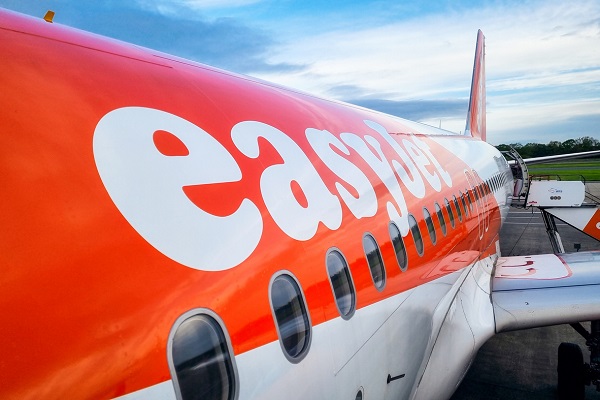Results guarantee easyJet shares fly in right direction
First-quarter figures have encouraged further buying of these airline shares which now trade near their best since spring 2022. ii's head of markets analyses the numbers.
24th January 2024 08:21
by Richard Hunter from interactive investor

Underlying progress at easyJet (LSE:EZJ) remains strong, despite a marginal impact arising from the Middle East conflict.
The group had previously reported that the general nervousness which prevented some passengers from flying due to the conflict would be short-lived, and indeed it was with a strong pick-up in demand from November. However, a pause in flights to Israel and Jordan, which remains in place, resulted in a direct impact of £40 million, with the possibility of more to come.
- Invest with ii: Open a Stocks & Shares ISA | ISA Investment Ideas | Transfer a Stocks & Shares ISA
Of course, these developments are an unfortunate reminder of why the airlines have historically been such a difficult sector in which to invest. External factors outside of the industry’s control have ranged over the years from pandemics to conflicts to volcanic ash clouds, let alone the possibility of strike actions affecting operating conditions. Even so, these factors are a cost of doing business and there are many other signs that easyJet is making a strong comeback given the most recent headwinds of the pandemic.
At a headline level, the pre-tax loss of £126 million for the quarter ended 31 December is an improvement from the £133 million loss the year previous, and easyJet expects the number to improve significantly given the current level of bookings, as well as its focus on capacity, productivity and a focus on costs generally.
The quarter saw group revenue increase by 22%, which included 20% growth in ancillary income. Indeed, the group has seen a true profitable benefit from ancillary revenues which continue to boost revenues, and which include the likes of customer payments for personally allocated seats, baggage and food.
The revenue number was also boosted by a strong contribution from easyJet holidays, which has all but come from a recent standing start to now represent 10% of group revenues. For the period, revenue growth of 95% was accompanied by customer growth of 48%, resulting in a profit of £30 million, as compared to £13 million in the corresponding period.
- 2024 Investment outlook: share tips, forecasts, tax, pensions and savings
- These UK leisure and hotel stocks are top picks for 2024
- The Analyst: Dzmitry Lipski’s investment insights
The group’s generally positive summer outlook also predicts further customer growth of more than 35%. The launch of the holidays unit seems to have come at the right time, with cost-conscious consumers searching for value packages, and the group has high hopes for the unit’s longer-term contribution to overall profits,
Other key metrics also showed a positive direction of travel for the most part, with revenue per seat increasing by 3% year-on-year and with costs per seat decreasing by 3%, excluding fuel. The load factor was basically unchanged at 86%, with passenger growth of 14% in the period equating to easyJet having flown 19.8 million customers in the quarter. Capacity growth is expected to roll out further in the coming financial year, with anticipated increases of 11% in the first half and 8% in the second.
Headwinds will continue to present themselves but for the moment easyJet seems well placed. Aside from the conflict in the Middle East, there remains the possibility that the consumer will again batten down the hatches on discretionary spend. That being said, there seems to be an increasing body of evidence to suggest that the family holiday remains almost sacrosanct and outside of normal budgetary restraints.
- Stockwatch: what to make of two big warnings on economic outlook?
- 37 growth stocks to own in 2024
- Insider: three chiefs buy this bombed-out FTSE 100 share
- 10 hottest ISA shares, funds and trusts: week ended 19 January 2024
easyJet’s recovering fortunes have been reflected in its share price, which has risen by 13% over the last year, as compared to a drop of 4.3% for the wider FTSE 250 index. Indeed, a bounce of 39% in the last three months alone has provided some momentum, although in terms of the price there is still some way to go, with the shares remaining down by 25% over the last three years.
Nonetheless, there seems to be an increasing band of followers for the company and its profit potential, with the market consensus of the shares recently having ticked up to a 'buy'.
These articles are provided for information purposes only. Occasionally, an opinion about whether to buy or sell a specific investment may be provided by third parties. The content is not intended to be a personal recommendation to buy or sell any financial instrument or product, or to adopt any investment strategy as it is not provided based on an assessment of your investing knowledge and experience, your financial situation or your investment objectives. The value of your investments, and the income derived from them, may go down as well as up. You may not get back all the money that you invest. The investments referred to in this article may not be suitable for all investors, and if in doubt, an investor should seek advice from a qualified investment adviser.
Full performance can be found on the company or index summary page on the interactive investor website. Simply click on the company's or index name highlighted in the article.